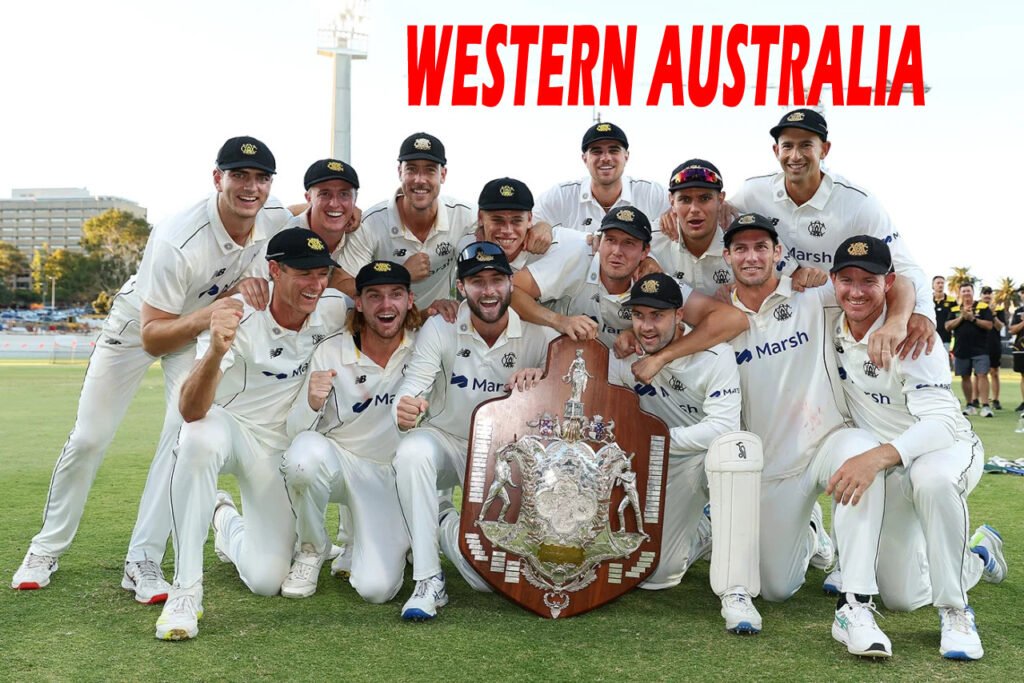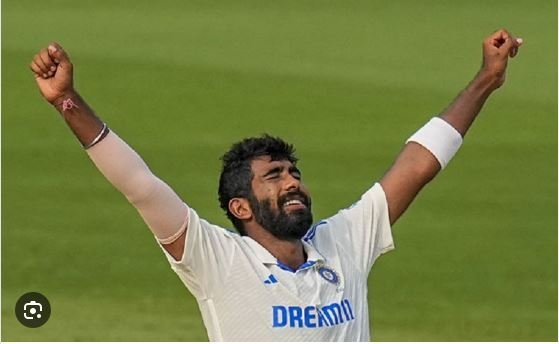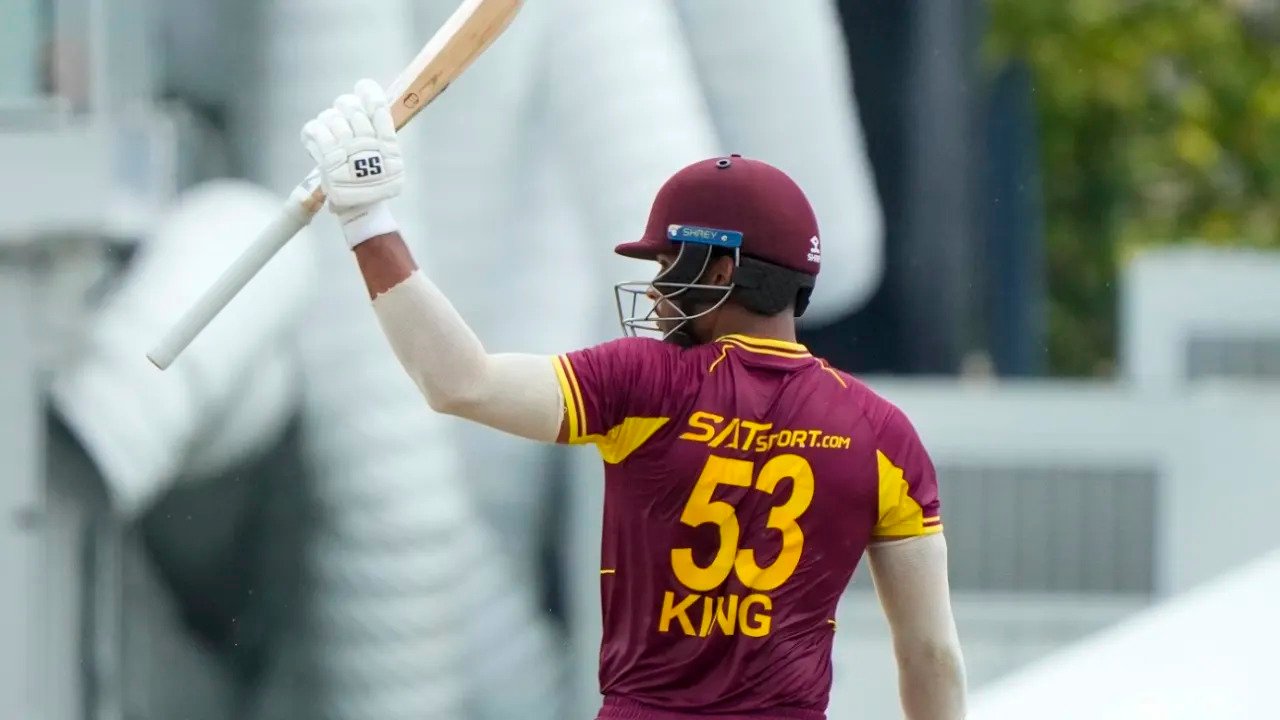In the Sheffield Shield Final, Western Australia’s Cameron Gannon and Corey Rocchiccioli led their team to a resounding victory in the Sheffield Shield, clinching a hat-trick of titles. Led by Captain Sam Whiteman, WA has cemented its place among the state’s most illustrious teams with an extraordinary hat-trick of Sheffield Shield titles.
On the fourth day, Tasmania was bundled out in a session as the hosts solidified their position as a domestic superpower.

Western Australia 347 (Whiteman 104, Connolly 90, Cartwright 55, Short 50) and 376 (Cartwright 94) defeated Tasmania 186 (Rocchiccioli 4-48) and 160 (Gannon 5-23, Rocchiccioli 3-55) by 377 runs.
Tasmania needed an unlikely 538 runs on a difficult surface, but they could only muster 40.5 overs before being bowled out for 160 after losing 5 for 18.
For the majority of his lengthy career, Gannon was a periphery bowler, but he excelled with a five-wicket haul, while Rocchiccioli concluded with 3 for 55.
After Gannon’s withering new-ball stint and Joel Paris’s wickets of Matthew Wade, Charlie Wakim, and Caleb Jewell, Tasmania collapsed. They were reduced to 26 for 3.
Tasmania’s hopeless pursuit came to an end fairly tamely when the Shield’s top run scorer, Beau Webster, fell late in the day, ending any possibility of a miracle. Tasmania played aggressively, needing an absolute victory to snap an 11-year drought, but they never really had a realistic chance against WA’s outstanding onslaught.
With a near faultless performance, WA solidified their position as the dominant team in Australian domestic cricket. It was WA’s first three-peat since the late 1980s and only the second in the previous 20 years. The only team to win the Shield and Marsh Cup three times in a row is WA.
After losing to South Australia in the previous round, Tasmania lost to Western Australia in the final, and they looked hopelessly outmatched against them.
WA’s plan, which saw them resume at 221 for 3, was to bat long and try to completely eliminate Tasmania from the game. As Hilton Cartwright and Aaron Hardie raced toward a century partnership, it seemed like they were accomplishing just that.
Up until the second new ball, Tasmania seemed to be only passing the time, but Webster gave them much-needed relief with a breathtaking diving one-handed grab at leg-slip, dismissing Hardie for 47 off Jarrod Freeman.
Webster experienced a range of emotions while immersed in the event. He bowled a cracker to Cartwright, which struck the top of off stump, and was left frustrated when the bail did not come loose. He dropped Cooper Connolly at slip. Several of the WA players rushed into the hotel to see a replay after they could not believe what they saw from the team’s balcony.
In retaliation, Webster held onto an edge Connolly gave him and celebrated by tossing the ball high into the air. Tasmania produced a disciplined effort and bowled at a much better length than what WA lacked for a large portion of their first innings.
However, Cartwright, who scored fifty runs in the opening innings, defied Tasmania and demonstrated his talent on the big stage after scoring fifty runs to win the match in the Marsh Cup final last month. Cartwright was looking for a century to round off a poor season, but he was painfully short when Webster had the final laugh, trapping him leg before wicket at the first sign of lunch.
Also Read: Western Australia Dominated Tasmania to Secure Title Hat-Trick
Also Read: Matthew Wade Set to Retire from First-Class Cricket
Tasmania was disappointed by WA’s more than proficient lower order, as they had planned to be batting in the second session. Working hard in the sun, Tasmania’s earlier spark faded as WA’s lead accelerated above 500.

However, the dismissals of Charlie Stobo (bowled by a delivery that skidded low) and Paris (bounced off the surface) scared Tasmania.
After tea, Tasmania’s suffering appeared to be over, but Wade’s nick of Gannon in the second over had them reeling at the crease. After Wade was fired, some WACA fans gave him a standing ovation, signaling the end of his red-ball career.
Jewell and Wakim went in consecutive overs as Gannon and Paris bowled menacingly with the new ball. Before the end, WA had a whiff of victory, but a 62-run partnership between Silk and Doran stabilized the ship. They scored really fast, countering Rocchiccioli’s spin, and WA had an attacking lineup as predicted.
However, Silk and Doran lost out when the few spectators on the terraces—many of whom had already departed for the AFL game at neighboring Optus Stadium—started to become animated.
The extra thirty minutes was called, and they were at fever pitch when Webster and Freemon fell in the same over from the unflinching Gannon. WA were unstoppable as Paris claimed a magnificent catch to complete a historic victory.
Skipper Sam Whiteman’s Insight
A double hat-trick of domestic state victories, this WA team has left a legacy that is difficult to overcome.
After winning three straight Sheffield Shield titles and crushing Tasmania at the WACA, captain Sam Whiteman stated Western Australia could be considered one of the state’s best ever teams.
In a lopsided final, WA achieved an overwhelming 377-run victory and won the title under unusual circumstances late in the fourth day. Tasmania had to chase down a record 538 runs to win the title, therefore the outcome was already inevitable. However, Western Australia cemented their position as Australia’s premier domestic cricket team by dismissing the Tigers in a thrilling 41 overs.

Ten minutes before stumps, Joel Paris made a stunning catch at gully to set off scenes of ecstasy on the field and in the terraces, fittingly sealing WA’s 18th Shield win.
Whiteman told reporters, “We were really hoping to finish it tonight, but we were on a shot clock.” “That final catch and that celebration… was just an amazing feeling that I’ll never forget.”
WA were put through their paces in a season of hardship, despite the fact that they dominated the championship match. Only five Shield matches were played by frontline quicks Jhye Richardson, Lance Morris, and Matt Kelly combined.
Following knee surgery in December of the previous year, Ashton Turner missed the most of the season despite reigniting his red-ball career with a century in the season’s final, while Cameron Green only participated in two games. Mitchell Marsh’s extensive international schedule across all forms prevented him from playing any domestic cricket this season.
With their bench players doing admirably in the championship game, WA was forced to rely on their depth of quality. In the first innings of Western Australia, debutant Cooper Connolly scored an incredible ninety, and D’Arcy Short, who hasn’t begun a first-class match since late 2019, scored fifty and thirty-eight.
He took the place of Cameron Bancroft, who was possibly WA’s best hitter and the team’s top run scorer the previous two seasons. Bancorft had a concussion in a cycling accident last weekend, thus he was ruled out of the final.
While fast Cameron Gannon, who has spent his entire career primarily on the sidelines, bowled brilliantly towards the conclusion of the season, taking five wickets to destroy Tasmania in their second innings.
“The way someone stood up when we really needed to throughout the year, it’s been amazing,” said Whiteman, who won player-of-the-final after Western Australia was sent in to bat on a surface tinged with green. Whiteman smashed his opening day century. The fact that someone else stepped up most of the time is the most satisfying aspect of it.
“This year has been really difficult due to injuries and Australian selection. Simply put, I’m really proud of the guys.”
Now a three-time captain of the Shield, Whiteman said the most recent victory was the sweetest in WA history. They furthered their legacy by being the first team to win the Shield and Marsh Cup simultaneously three times in a row.
After their storied squad of the late 1980s, which included Terry Alderman, Tom Moody, and Geoff Marsh, WA achieved its first hat-trick of Shield wins.
Even the legendary Western Australia squad of the 1990s, which had several players who went on to become Test greats, was unable to accomplish the feat. In the last 20 years, only Victoria from 2015–17 has won three straight.
“In my opinion, it’s (the prettiest title),” stated Whiteman. “We need to be among the best WA teams, especially after the one-day incident. It must be one of the greatest WA Shield teams.” I hope there will be more success in the future.
Most Sheffield Shield Titles
Australia’s domestic first-class cricket competition is called the Sheffield Shield (now called the Marsh Sheffield Shield due to sponsorship). Teams from each of Australia’s six states compete in the competition. Lord Sheffield is honored with the moniker Sheffield Shield.
Many intercolonial matches were played before the Shield was created. The first competition for the Lord Sheffield-donated Shield took place in 1892–93 between Victoria, South Australia, and New South Wales. Tasmania for the 1977–78 season, Western Australia for the 1947–48 season, and Queensland for the 1926–27 season were all admitted.
A double-round robin style is used for the competition, with each team playing every other team twice—at home and away. The top two teams compete in a championship game at the conclusion of the season. Points are given out based on victories, draws, ties, and extra points for runs and wickets in a team’s first 100 batting and bowling overs. The final is a five-day event, while regular matches last four days.
- New South Wales tops the list with 47 titles to their cabinet.
- Victoria grabs the second most no of titles with 32 titles.
- Western Australia ranked third with 18 titles.
- South Australia ranked fourth with 13 titles.
- Queensland has 9 titles to their name.
- Tasmania ranked sixth with 3 titles.





